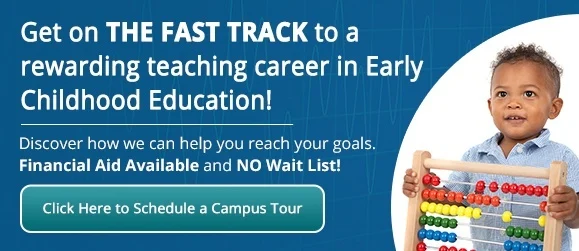Qualities of a Great Early Childhood Educator
Posted On September 29,2023
Becoming an early childhood educator is a rewarding and fulfilling career choice that appeals to many people. Teaching preschool is not just about imparting knowledge to young children; it’s about nurturing their growth, building a strong foundation, and shaping their academic future. 
Early childhood educators are driven by a profound love for teaching and learning. They aim to have a positive impact during the formative education years and play a pivotal role in social development. They recognize their influence on future generations, molding young minds with vital skills, values, and hopefully a passion for learning.
The preschool years are instrumental in nurturing cognitive, social, and emotional growth in children, and teachers find joy in witnessing their students’ progress. They also find fulfillment in cultivating and directing the innate curiosity of young learners, sparking a lifelong love for discovery and exploration.
Teachers have the unique opportunity to build strong educational foundations by helping children develop essential skills like literacy, numeracy, and social skills, which are vital for future academic success. They embrace creative teaching methods, and find ways to incorporate art, music, and storytelling to promote imagination and creativity while encouraging children to think outside the box.
Patience is a Virtue
Patience is perhaps the most critical quality for an early childhood educator. Young children are curious, energetic, and often impulsive. They may struggle to focus, sit still, or follow simple instructions. A great early childhood educator understands these challenges and responds with unwavering patience. They know that children learn at their own pace and need time to explore, make mistakes, and discover the world around them.
Compassion and Empathy
Compassion and empathy are the foundations of a nurturing and supportive learning environment. A great educator genuinely cares for the well-being of each child in their care. They are sensitive to their emotional needs, and they create a safe space where children feel valued and understood. Whether a child is happy, sad, or struggling with a problem, a compassionate educator is there to offer comfort and support.
Learn More about Our Early Childhood Education ProgramAdaptability
Flexibility and adaptability are essential qualities for any educator, but they are especially important in early childhood education. Every day in the classroom is different, and childrens’ needs and moods can change quickly. Successful early childhood educators are skilled at adjusting their teaching methods, lesson plans, and interactions to meet the ever-evolving demands of their young students.
Creativity
Early childhood education is a realm of creativity and imagination. Children thrive when their lessons are engaging and interactive. Creative educators infuse art, storytelling, music, and hands-on activities into their teaching methods. They understand that fostering a child’s imagination can lead to greater cognitive and emotional development.
Strong Communication Skills
Effective communication is at the heart of teaching. Great early childhood educators have excellent communication skills, allowing them to convey ideas, emotions, and instructions clearly. They also actively listen to children and encourage them to express themselves. The ability to communicate with parents and caregivers is equally essential, as it fosters collaboration and support for a child’s healthy development.
Observational Skills
Early childhood educators need keen observational skills to understand each child’s unique needs and learning styles. By closely watching and assessing children, educators can tailor their teaching methods to optimize individual growth. They can identify when a child is struggling or excelling and adapt their approach accordingly.
Enthusiasm and Positivity
An enthusiastic teacher is infectious and a positive attitude can have a profound impact on the learning environment. Successful educators bring a sense of joy and wonder to the classroom. Their enthusiasm is contagious, motivating children to engage with learning and approach challenges with confidence.
Organizational Skills
A preschool classroom can be a chaotic place, and maintaining order is key. Strong organizational skills help early childhood educators manage materials, schedules, and routines effectively. A well-organized classroom not only fosters a more efficient learning environment but also provides a sense of security and predictability for young children.
Problem-Solving Abilities
As an early childhood educator, you’ll encounter various challenges, from behavioral issues to learning difficulties. The ability to think critically, solve problems, and go with the flow is invaluable. Educators who approach challenges with a constructive mindset and seek solutions that benefit the child’s development and well-being will make a strong connection with students.
Adaptation to Diversity
In today’s multicultural world, early childhood educators who are inclusive and embrace diversity will create an atmosphere of acceptance. They nurture a space where children from various backgrounds, cultures, and abilities feel welcomed and valued. It’s a great way to teach respect and understanding while fostering a sense of unity.
Knowledge of Child Development
A deep understanding of child development is fundamental for early childhood educators. It helps them tailor their teaching methods to align with developmental milestones. Being aware of what children are capable of at different ages allows ECE teachers to set realistic expectations and provide age-appropriate activities.
Teamwork and Collaboration
Teaching young children often involves working closely with other educators, support staff, and parents. Early childhood educators are team players who collaborate effectively with others to create a comprehensive support system for the children in their care. They understand the value of input from colleagues and parents in a child’s academic development, and it shows.
Dedication to Lifelong Learning
The field of early childhood education is ever-evolving. Preschool teachers have a passion for learning and continually seek professional development opportunities to enhance their knowledge and skills. They stay updated on the latest research and educational trends to provide the best possible experiences for their students.
Resilience
The work of an early childhood educator can be emotionally and physically demanding. There are challenging moments, setbacks, and sometimes even heartbreaks. Resilience is the ability to bounce back from adversity and continue to provide a nurturing, stable, and supportive environment for children.
The qualities and skills that make a great early childhood educator go beyond mere instruction. Patience, compassion, and creativity along with a myriad of other enriching characteristics all contribute to the success of an educator in this field. If you’re aspiring to become an early childhood educator, you will play a crucial role in shaping the lives of the next generation. Now is a great time to become a preschool teacher. With our caring staff and faculty, flexible class schedules, and no wait list, there’s no better place to start than at Athena Career Academy. Contact us to learn more about how to enroll.